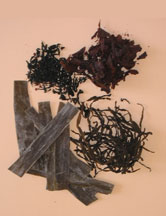Sea Vegetables

Sea vegetables are an excellent source of food. For
centuries many different cultures have incorporated them into their
diets. Over seventy-five varieties are eaten throughout the world. The
Japanese in particular have used sea vegetables extensively in their
diet. Sea vegetables are very high in minerals such as calcium, iron
and phosphorus, as well as vitamins and other nutrients. Some varieties
have over twenty times as many minerals as land vegetables. Many sea
vegetables are an excellent source of calcium. This is especially
important to women when they enter menopause. During this phase many
women become vulnerable to osteoporosis, a condition in which the bones
become weak and brittle. Because of their high calcium content, sea
vegetables can be a healthy alternative to eating dairy products, which
for a variety of reasons are often not a good food for many people.From
the perspective of oriental medicine, foods can be classified according
to whether they are predominantly yin or yang. Sea vegetables are
predominatly yin and their energetic quality is cool.
Kombu
Kombu is a particularly important sea vegetable, and one that can be used regularly in cooking. It is a member of the kelp family and grows in many of the oceans around the world. Some plants grow up to 1500 feet long. It can be added to grains and beans when they are being cooked. During the cooking the nutrients from the kombu are absorbed by whatever it is being cooked with. One of the many benefits of kombu is that it makes it easier for the body to digest beans. Because the nutrients from the kombu are absorbed by the food, there is no need to eat the kombu. This is fortunate, because people who are not used to eating sea vegetables may not find the taste appealing! To use kombu in this way, simply add a three-inch strip to one or two cups of grains or beans and cook in the normal way. Kombu can be reused several times and
added to other batches of grains or beans.Kombu in the form of kelp
pills is often recommended to be taken by people undergoing radiation.
This is because kombu is very cooling and it helps to counteract the
severe heating effects that radiation produces.
Wakame
Wakame is classified as being very cooling. It acts as a diuretic,
softens hardened tissue and tonifies yin. It also has a very high
calcium content. Wakame can be added to soups, such as miso soup, and
can also be cooked with other vegetables. It cooks in a few minutes,
and it has a delicate flavor that doesn't overpower other foods.
Arame Arame is an excellent source of calcium, iron, iodine. It is very easy to cook, simply boil it in
water for about ten minutes. It does not have a strong flavor. It can be
eaten as a side vegetable, or added to soups and salads.
Nori
Nori has many of the same properties as wakame. It
is also classified as being very cooling. It acts as a diuretic,
softens hardened tissue and tonifies yin. It has a very high protein
content and is very easy to digest. It is used to wrap sushi (which is
remarkably easy to make). It can also be added to soups and used as a
condiment.
Sea Palm Sea Palm is a native Californian sea vegetable.
Its properties are similar to kombu. It can be added to other
dishes such as vegetables and soups,
and is also used as a condiment. It has a mild taste and
blends well with other foods.
Agar-agar
Agar-agar is a natural gelatin and can be used to make puddings
and vegetable aspics. It has a slightly sweet flavor which makes
it good for making
desserts.
The following chart shows the astonishingly high mineral content
of several sea vegetables.
Sea Vegetables Mineral
Content
(milligrams per 100 grams) |
| |
Calcium |
Phosphorus |
Iron |
| Agar-agar |
567 |
22 |
6.3 |
| Arame |
1170 |
150 |
12.0 |
| Kombu |
800 |
150 |
x |
| Nori |
260 |
510 |
12.0 |
| Wakame |
1300 |
260 |
13.0 |
One of the effects of modern farming with its use of artificial
fertilizers, is that the mineral and vitamin content of most commercially
grown food is
significantly lower than organically grown food. Including sea vegetables
in your diet can help to ensure that your are getting sufficient nutrients
in a natural way, and one that is easy for your body to absorb.
Many
sea vegetables can be bought at local health foods stores, and those that
are not in stock can usually be ordered.
Other articles concerning diet:
Other Recipes:
|